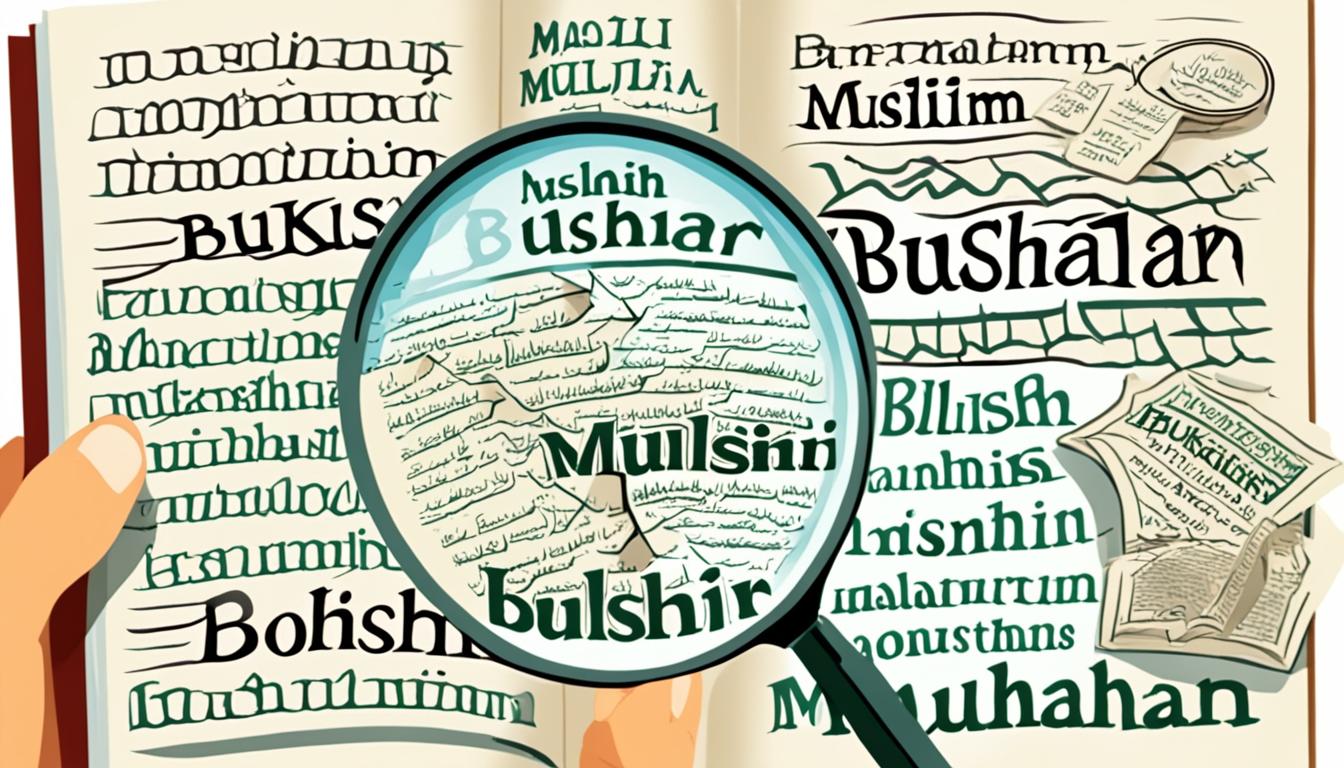Challenging the Infallibility: A Critical Examination of Bukhari and Muslim
What if the texts that guide Islamic practice aren’t perfect? This look into Bukhari and Muslim explores their authority and authenticity. It’s important to know how they were made and what people think of them today. This can change how we see right and wrong in Islam.
In the 1700s, Muslim scholars started to question the basics of Islamic knowledge, especially Hadith. They looked into Yemen’s Hadith studies to understand its value. This article will show how challenging these texts affects today’s Islamic thought.
Key Takeaways
- The eighteenth century was key in questioning Hadith stories.
- Scholars pushed for Hadith study reform, leading to new views.
- Islamic law classifications are still changing today.
- Debates on Bukhari and Muslim show we need to think deeply about ethics now.
- Knowing how Hadiths were put together helps us judge their trustworthiness.
- New views can shake up old, strict beliefs in Islamic scholarship.
The Doctrine of Infallibility in Islamic Texts
The idea of infallibility in Islamic texts is key to the Muslim faith. It means the Quran and Hadith are seen as perfect. This belief leads to a strict moral code that doesn’t change over time. It affects how people make moral choices and what they see as right and wrong.
Understanding Infallibility and Its Implications
In Islam, the Quran and Hadith are seen as flawless. This can make people hesitant to question them, even when they seem to contradict each other. These texts are crucial for understanding religious beliefs and actions. But, fearing to question them can stop moral growth, which is important today.
Some argue that keeping Prophet Muhammad’s image perfect is crucial. They think it’s more important than dealing with parts of his teachings that seem wrong. However, looking closer shows that some sayings might not even be from him. This opens up different ways to see things.
The Role of the Quran in Islamic Faith
The Quran is more than just a book in Islam; it’s the base of the faith. Followers try to live by its teachings. But, the idea of infallibility makes it hard to interpret the Quran today. It’s like trying to follow old rules while dealing with new problems.
Finding a way to keep the Quran’s purity while still understanding it is a big challenge. It’s about growing and learning in today’s world while staying true to faith.
Historical Context of Hadith Collections
The history of Hadith collections is key to understanding their role in Islam. These texts share the teachings and ways of Prophet Muhammad. Scholars over the years have gathered and written them down. Imam Bukhari and Imam Muslim were major figures in creating texts that shape Islamic thought today.
Timeline of Hadith Compilation and Preservation
The process of collecting Hadith was slow and careful. At first, people passed down stories by mouth. Later, they started writing them down. Imam Bukhari worked hard, checking about 600,000 stories to pick around 7,000 for his book, Sahih al-Bukhari.
This book was huge; it filled a whole bookshelf when sent from Saudi Arabia. It shows how important and detailed it was.
As time went on, differences between Hadith and the Quran caused debates among scholars. Some reports talked about missing Quran verses, like those about stoning for adultery. These issues show the challenges in preserving Hadith and understanding their history.
Key Figures in Hadith Compilation: Bukhari and Muslim
Imam Bukhari and Imam Muslim were crucial in gathering Hadith. Their works are seen as top sources of Islamic teachings. Scholars value them for their careful selection process. Bukhari looked closely at who was sharing the stories, which some now question because of possible mistakes.
The debate over their collections’ trustworthiness is tied to the Hadith’s history. It affects how today’s scholars and Muslims see these texts.
Challenging the Infallibility: A Critical Examination of Bukhari and Muslim
Bukhari and Muslim are key to Sunni Islamic teachings. They aim to capture what Prophet Muhammad taught and did. Yet, there are big questions about their accuracy and completeness.
There’s a big gap between when the Prophet died and when these collections were finished. This gap makes us wonder if Bukhari and Muslim are truly reliable sources.
Authenticity and Reliability of Bukhari and Muslim
Imam Mohammad Bukhari wrote his collection 210 to 240 years after the Prophet’s death. This long time raises doubts about their trustworthiness. Bukhari used about 36,000 people as sources, but mostly through second-hand stories.
Many trustworthy narrators were alive soon after the Prophet, but we worry about the accuracy over such a long time.
Contradictions in Hadith Narrations
Looking closely at Hadiths shows many contradictions. These can make us doubt their value as clear guides. Some Hadiths seem to go against the Quran’s ethics.
For example, some Hadiths might not fit with today’s values. It’s also said that some teachings came from the Prophet’s companions, not him directly. This makes us question their consistency.
We need to look closely at these texts and their effects today. Finding and talking about these contradictions is key to a deeper understanding of Islam. It helps us adapt to new ethical standards and human rights.
| Collection | Time of Compilation (years after Prophet) | Number of Narrators Cited | Average Narrators per Hadith |
|---|---|---|---|
| Bukhari | 210-240 | 36,000 | 5 |
| Muslim | Approximately similar | Varied | Varied |
Hadith Compiler Credibility Review
Understanding the credibility of Hadith compilers is key to grasping Islamic teachings. Bukhari’s work stands out for its thorough approach. He used about 36,000 people as sources, with each Hadith having around five narrators. This large network means we must look closely at the trustworthiness of these narrators and Bukhari’s methods.
Assessing Bukhari’s Methodology
Bukhari focused on the chain of narrators, or isnad, to check Hadith authenticity. He mostly trusted the last narrator in the chain, without directly talking to those before. This method, though careful, might have missed some reliability checks.
Scholars back then judged narrators by their honesty and knowledge. But, the time Bukhari lived was filled with sect conflicts and false info. This makes judging the trustworthiness of Hadith compilers harder.
Factors Influencing Narrator Trustworthiness
Trust in narrators comes from their reputation, social position, and the time they lived in. Bukhari was far from the Prophet’s companions, over 200 years later. This gap makes us wonder about the accuracy of the stories passed down.
Some like Hasan Basri and Nafi’ were known for their truthfulness. But, their stories might have changed over time and through different people’s views. Bukhari’s work came during a time of big theological debates. So, we must consider these factors to understand the challenges in keeping Hadith true.
Traditional Hadith Interpretation Analysis
The traditional hadith interpretation has shaped Islamic thought for a long time. However, it can be quite rigid. Scholars and followers often stick to historical contexts and established meanings. This can stop new ideas from being discussed in how we apply hadith today.
The strict frameworks of these interpretations can also limit our understanding of Islamic texts. It’s important to look into these limitations.
The Rigidity of Traditional Interpretations
Rigid interpretations come from the core texts of Sunni and Shia traditions. Sunni Muslims look to Kutub Al-Sittah, including Sahih Bukhari and Sahih Muslim. Shia Muslims prefer Al-Kutub Al-Arb’ah, with Kitab al-Kafi and Al-Istibsar as main sources.
This division can make it hard to question traditional hadith interpretation. It might lead to just following the crowd instead of thinking deeply. Also, the classification of hadiths as sahih (authentic), hasan (good), and da’if (weak) makes some hadiths seem set in stone. This ignores how their meanings change with context.
Emerging Alternative Interpretations
On the other hand, new interpretations are becoming more popular. They focus on understanding the context and the spirit of the text, not just the words. This approach helps believers connect with Islamic law and teachings in a way that fits today’s values and ethics.
These new interpretations bring more diversity to the faith. They open up a richer conversation on how hadith guides our lives today.
Sunni Hadith Skepticism: A Growing Movement
Sunni hadith skepticism is now a big topic in Islamic studies. It shows a need for more critical thinking in Islamic scholarship. Scholars are questioning the old ways of collecting and understanding hadith. This leads to new discussions in the Muslim community.
Rise of Critical Thinking within Islamic Scholarship
Scholars like Dr. Jonathan Brown are pushing for more critical thinking in hadith studies. His talk, “Hadith Between Muslim Conviction and Criticism,” talked about how culture affects how we see hadith. This push for skepticism makes scholars look at historical and social factors when reading religious texts.
Western and Muslim scholars have different views on this topic. Many scholars today suggest looking at both the history of the hadith and its content. This shows that even old scholars had to deal with tricky hadiths. This change could change how we see hadith and Islamic authority.
Impact on Islamic Thought and Practice
Skepticism about Sunni hadith is changing how Muslims think and act. Looking into tricky hadiths leads to deeper talks on ethics and interpretation. This critical thinking helps people balance their faith with today’s world, making them rethink religious practices.
This leads to more than just theological debates. It affects how communities teach and what people believe, making them think more deeply about their faith. This movement could be a wake-up call for Islamic thought, pushing people and scholars to question their beliefs more deeply.
Ethical Challenges and Human Rights Issues
The mix of ethical challenges in Islam and human rights issues in Islamic texts is complex. Scholars and practitioners face this challenge. With more progressive Muslim voices, there’s a push for reform. This brings together old beliefs and modern ethics.
Conflicts with Contemporary Ethical Standards
Many ethical challenges in Islam clash with universal human rights. Traditional views often focus on group duties, not individual rights. For example, gender equality and other rights are often debated in Islamic texts. These issues show a gap between old practices and today’s ethical standards.
- Gender inequality challenges traditional Islamic roles.
- Few modern rights face strong opposition from old interpretations of scriptures.
- Comparing Islamic law with international human rights shows different views.
Testimonies from Progressive Muslims
Progressive Muslim voices offer key insights on blending Islamic teachings with human rights. They push for a new look at traditional texts, fitting them with today’s morals. These Muslims aim to use Islam’s ethical side while understanding past issues that led to human rights problems.
| Year | Declaration | Focus |
|---|---|---|
| 1981 | Universal Islamic Declaration of Human Rights | Rights within an Islamic framework |
| 1990 | Cairo Declaration of Human Rights in Islam | Integrating Islamic principles with human rights |
| 1948 | Universal Declaration of Human Rights | Global human rights standards |
Religious Text Critical Appraisal
Looking closely at religious texts is key to understanding today’s views and laws based on Hadith. This analysis helps believers balance faith with reason. As times change, it’s vital to check if Hadith-based law still fits with our ethical values.
Examining the Legitimacy of Hadith-based Law
Asking tough questions about Hadith-based law doesn’t mean you don’t believe. It shows you value thinking things through and want to understand better. Muhammad’s companions were careful with their legal decisions, knowing it was important to think deeply about them.
Today, Muslims are encouraged to ask for clear reasons from religious leaders. This helps create a space for careful thought and discussion.
The Intersection of Faith and Critical Analysis
Trying to mix faith with critical thinking helps us deal with today’s moral issues. For example, debates over some modern rights bring up different views based on religious texts. The Quran and Hadith give us moral guidelines, but they can sometimes conflict with our modern values.
It’s important to think deeply about Islamic texts to avoid just accepting any interpretation. We should use our knowledge and history to guide us. This way, faith and careful thought can go hand in hand, leading to better decisions.
| Key Concepts | Traditional Understanding | Modern Insights |
|---|---|---|
| Infallibility | Infallibility prohibits critique of scriptures | Encourages questioning to foster reform |
| Legal Edicts | Granted with caution by companions | Modern scholars urged to provide rationale |
| Faith vs. Interpretation | Faith grounded in scripture | Interpretation is open to critical analysis |
| Moral Challenges | Scriptures viewed literally | Calls for historical and metaphorical context |
| Inclusivity | Traditional views against sensitive issues | Moderates struggle with reconciling beliefs |
Conclusion
The study of Bukhari and Muslim shows a deep link between faith, tradition, and ethics in Islamic scholarship. Many of the 1.8 billion Sunni Muslims follow Saḥīḥ Bukhārī’s teachings. This shows how important community and knowledge are in their faith. Yet, we must balance this with today’s values, like human rights and ethics.
Thinking about Hadith authenticity is key today. Scholars like Ibn Taymīyah point out that different views exist, but Islamic principles are key. New groups within Islam are pushing for change. They want reforms that fit with today’s values.
This means we need to rethink the old ideas about the Quran and Hadith. We should aim for a kinder approach that welcomes everyone. This way, all Muslims can feel included.
We see a clear need for change in Islamic studies. By facing the hard parts of religious texts, we open up a space for deep thinking about faith. We need honest talks to make sure all views in the Muslim world can live together peacefully. This will help us find a fair way to understand religious teachings.
Source Links
- No title found
- Modern approaches to address the concept of territorial division in Islamic jurisprudence
- Chapter 8: Concerning the two Sahihs of al-Bukhari and Muslim
- Critical Thinking and The Prophet — The Black American Muslim
- Now More Than Ever It’s Vital for Muslims to Reexamine Our Approach to Hadith in Islam
- Hadith, a critical view and overview- Part 2 | Submission.org
- The Covenants of the Prophet Muhammad Continue to Cause Controversy – Maydan
- Challenging Religious Infallibility And Divine Homophobia
- ‘MYTHS AND REALITIES OF HADITH — a critical study’
- Review of “Authentication of Hadith – Redefining the Criteria” by Israr Ahmad Khan
- Hadith
- Hadith: Between Muslim Conviction & Western Criticism | Dr. Jonathan Brown
- Have You Been Blackmailed With Bukhari Yet?
- Microsoft Word – Morgan-Foster_Islam_Final.doc
- Critical Thinking For Muslims : A Lecture by Tariq Ramadan
- Difference of Opinion: Where Do We Draw the Line? | Yaqeen Institute for Islamic Research







